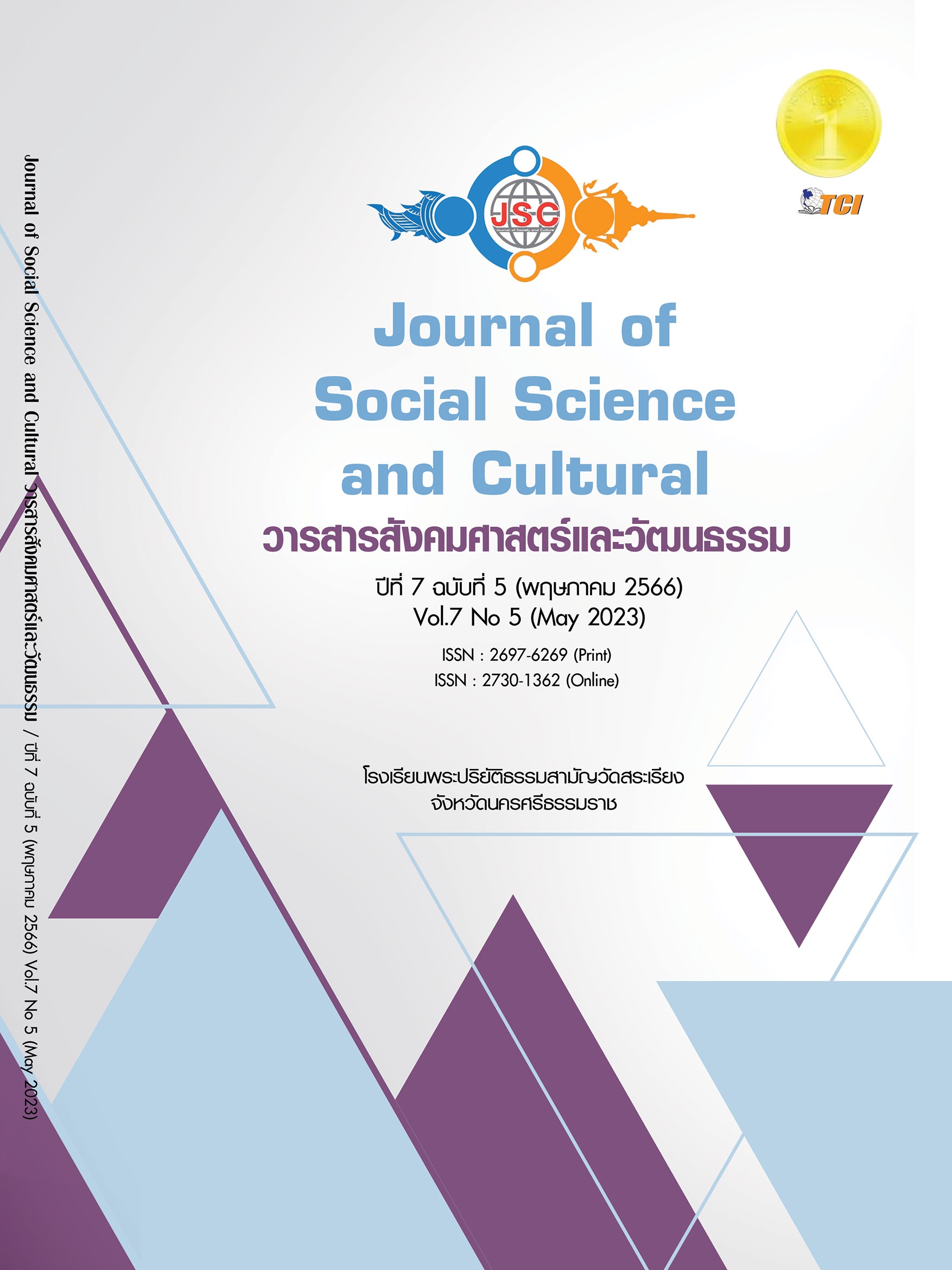THE DEVELOPMENT OF RECREATIONAL PROGRAM TO PROMOTE EXECUTIVE FUNCTIONS IN EARLY CHILDHOOD
Main Article Content
Abstract
The purposes of this research were 1) to develop a recreation program to promote executive function skills of early childhood, 2) to study the effect of participating in a recreation program on executive functions skills of early childhood. It was a quasi-experimental research, divided into 3 phases: 1) to study the needs of recreational activities to enhance executive function skills of early childhood; 2) to develop a recreation program to enhance executive skills of early childhood by experts and 3) to study the results of participating in recreation programs to promote executive function skills of early childhood with a sample of 51 early childhood by matching methods (Match-Paired sampling) divided into an experimental group of 25 people and a control group of 26 people. The research tools were 1) the need questionnaire for recreational activities to promote executive function skills of early childhood; executive functions of early childhood and 3) behavioral evaluation form of executive function skills of early childhood. The statistics used in the research were percentage, mean, standard deviation. and t-test The results of the research were as follows: 1) The study of the need for recreational activities to promote executive function skills of early childhood. Overall, it was at the highest level. 2) The development of a recreation program to promote executive function skills of early childhood was most appropriate and could be applied to practice. 3) Executive Function skills of early childhood in the experimental group after attending program was higher than before the participation at a statistical significance at the .05 level, and executive function skills of the experimental group preschool children were higher than the control group at a statistical significance at the .05 level.
Article Details
References
กรมพลศึกษา. (2560). แผนปฏิบัติการด้านนันทนาการ ฉบับที่ 3 (2563-2565). เรียกใช้เมื่อ 15 ตุลาคม 2563
จาก https://www.dpe.go.th/manual-preview-412991791793.
กระทรวงศึกษาธิการ. (2560). หลักสูตรการศึกษาปฐมวัย. เรียกใช้เมื่อ 16 ตุลาคม 2563 จาก
http://www.opes.go.th/sites/default/files/users/user1/60_0.pdf
กำโชค เผือกสุวรรณ. (2559). ผู้นำนันทนาการ=Recreation leader. กรุงเทพมหานคร: สำนักพิมพ์แห่ง
จุฬาลงกรณ์มหาวิทยาลัย.
กิติยวดี บุญซื่อ และคณะ. (2541). การเรียนรู้อย่างมีความสุข สำนักงานคณะกรรมการการศึกษาแห่งชาติ การ
ปฏิรูปการเรียนรู้ตามแนวคิด 5 ทฤษฎี. กรุงเทพมหานคร: ไอเดีย สแควร์.
คณะกรรมการส่งเสริมและพัฒนาเด็กและเยาวชนแห่งชาติ. (2560). แผนพัฒนาเด็กและเยาวชนแห่งชาติ ฉบับที่2
พ.ศ. 2560-2564. เรียกใช้เมื่อ 16 ตุลาคม 2563 จาก
file:///C:/Users/ACER/Downloads/Documents/PlanChilden2560-2564.pdf
ณรุทธ์ สุทธจิตต์. (2541). จิตวิทยาการสอนดนตรี. กรุงเทพมหานคร: สำนักพิมพ์แห่งจุฬาลงกรณ์มหาวิทยาลัย.
ดวงตา เจริญทรัพย์. (2553). การเล่นของเด็ก ปว.333: เอกสารประกอบการสอนวิชา=CE. 333 (Play of
children). กรุงเทพมหานคร: สาขาวิชาการศึกษาปฐมวัย มหาวิทยาลัยศรีนครินทรวิโรฒ.
เทพประสิทธิ์ กุลธวัชวิชัย. (2556). การนันทนาการ (พิมพ์ครั้งที่2). กรุงเทพมหานคร: สำนักพิมพ์แห่ง
จุฬาลงกรณ์มหาวิทยาลัย.
นวลจันทร์ จุฑาภักดีกุล. (2559). การวิจัยนวัตกรรมการเรียนรู้และการจัดการศึกษาเพื่อการพัฒนาที่ยั่งยืน.
เรียกใช้เมื่อ 22 กันยายน 2563 จาก
file:///C:/Users/ACER/Downloads/pdf_06_09_59_part1.pdf.
นวลจันทร์ จุฑาภักดีกุลและคณะ. (2560). การพัฒนาและหา
ค่าเกณฑ์มาตรฐานเครื่องมือประเมินการคิดเชิงบริหารในเด็กปฐมวัย. เรียกใช้เมื่อ 15 สิงหาคม 2563
จาก file:///C:/Users/ACER/Downloads/hs2311.pdf.
บันลือ พฤกษะวัน. (2551). จุดประกายสมองของเด็กปฐมวัย คู่มือครูและผู้ปกครอง (พิมพ์ครั้งที่ 2).
กรุงเทพมหานคร: สำนักพิมพ์แห่งจุฬาลงกรณ์มหาวิทยาลัย.
ประเสริฐ ผลิตผลการพิมพ์. (2561). เลี้ยงลูกอย่างไรให้ได้ EF (พิมพ์ครั้งที่ 3). กรุงเทพมหานคร: แพรวเพื่อนเด็ก.
ปรีดา ปัญญาจันทร์และคณะ. (2553). เล่า ร้อง เต้น เล่นละคร เทคนิคการสอนเด็กปฐมวัยอย่างมีสุนทรียะ. กรุงเทพมหานคร: แปลนสารา.
พัชราภา ตันติชูเวช. (2560). เจเนอเรชันแอลฟา : เจเนอรเรชันใหม่ในสังคมไทยศตวรรษที่ 21. กรุงเทพมหานคร:สำนักพิมพ์แห่งจุฬาลงกรณ์มหาวิทยาลัย.
รชต ถนอมกิตติ. (2560). ผลของโปรแกรมการเต้นแอโรบิกที่มีต่อสมาธิของเด็กก่อนวัยเรียน. (ปริญญานิพนธ์ปริญญามหาบัณฑิต, มหาวิทยาลัยศรีนครินทรวิโรฒ, กรุงเทพฯ). เรียกใช้เมื่อ 26 กันยายน 2563 จาก http://thesis.swu.ac.th/swuthesis/Dev_Psy/Ratchata_T.pdf.
วนิษา เรซ. (2553). เล่นให้เป็นอัจฉริยะ. ปทุมธานี: สมองดีกับหนูดี.
วิจารณ์ พานิช. (2555). วิถีสร้างการเรียนรู้เพื่อศิษย์ในศตวรรษที่ 21 (พิมพ์ครั้งที่ 3). กรุงเทพมหานคร:: มูลนิธิสด
ศรี-สฤษดิ์วงศ์.
สมบัติ กาญจนกิจ. (2542). นันทนาการชุมชนและโรงเรียน (พิมพ์ครั้งที่ 3) กรุงเทพมหานคร:: สำนักพิมพ์แห่ง
จุฬาลงกรณ์มหาวิทยาลัย.
สำนักงานคณะกรรมการพัฒนาการเศรษฐกิจและสังคมแห่งชาติ สำนักนายกรัฐมนตรี. (2560). สรุป
สาระสำคัญแผนพัฒนาเศรษฐกิจและสังคมแห่งชาติ ฉบับที่ 12 (พ.ศ. 2560-2564). เรียกใช้เมื่อ 20
กันยายน2563 จาก https://www.nesdc.go.th/ewt_dl_link.php?nid=6422.
สำนักนายกรัฐมนตรี. (2562). การประกาศแผนแม่บทภายใต้ยุทธศาสตร์ชาติ (พ.ศ. 2561-2580). เรียกใช้เมื่อ
กันยายน 2563 จาก file:///C:/Users/ACER/Downloads/Documents/T_0001.PDF.
สิริมา ภิญโญอนันตพงษ์. (2553). การวัดและประเมินแนวใหม่: เด็กปฐมวัย (พิมพ์ครั้งที่ 3). กรุงเทพมหานคร:
ดอกหญ้าวิชาการ.
สุภาวดี หาญเมธี. (2560). เติบโตตามรอยพ่อ. กรุงเทพมหานคร: รักลูกบุ๊กส์.
สุวิมล ตั้งสัจจพจน์. (2553). นันทนาการและการใช้เวลาว่าง. กรุงเทพมหานคร: สาขาวิชานันทนาการ
มหาวิทยาลัยเกษตรศาสตร์.
Austin, D.R. (1996). Therapeutic recreation: an introduction (2nd ed.). Boston: Allyn and Bacon.
Rossman, J. R. (2008). Recreation programming : designing leisure experiences (5th ed..):
Champaign : Sagamore Publishing.
Rossman, J. R., และ Schlatter, B. E. (2008). Recreation programming : designing leisure experiences
(5th ed.). Champaign: Sagamore Publishing.


